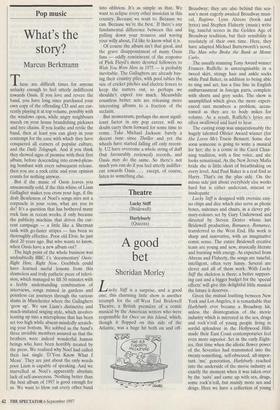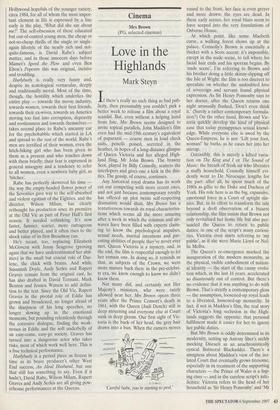Theatre
Lucky Stiff (Bridewell) Hurlyburly (Queens)
A good bet
Sheridan Morley
Lucky Stiff is a surprise, and a good one; this charming little show is another triumph for the off-West End Bridewell Theatre, a British premiere of a comic musical by the American writers who were responsible for Once on this Island, which, though it flopped on this side of the Atlantic, was a huge hit both on and off- Broadway; they are also behind this sea- son's most eagerly awaited Broadway musi- cal, Ragtime. Lynn Ahrens (book and lyrics) and Stephen Flaherty (music) write big, tuneful scores in the Golden Age of Broadway tradition, but their sensibility is resolutely of their own time. Here, they have adapted Michael Butterworth's novel, The Man who Broke the Bank at Monte Carlo.
The usually stunning Tony Award winner Frances Ruffelle is unrecognisable in a tweed skirt, stringy hair and ankle socks while Paul Baker, in addition to being able to sing and act, has a fine line in English embarrassment in foreign parts, complete with shorts and grey socks. The show is unamplified which gives the more experi- enced cast members a problem, accus- tomed as they are to body mikes for volume. As a result, Ruffelle's lyrics are often swallowed and hard to hear.
The casting coup was unquestionably the hugely talented Olivier Award winner (for She Loves Me) Tracie Bennett. Some day soon someone is going to write a musical for her; she is a comic in the Carol Chan- ning tradition, with a fine voice, and she looks sensational. As the New Jersey Mafia bride she is little short of breathtaking on every level. And Paul Baker is a real find as Harry. That's on the plus side. On the minus side just about everybody else works hard but is either undercast, miscast or inadequate Lucky Stiff is designed with oversize casi- no chips and dice which also serve as phone boxes, suitcases and chairs, in a clever pri- mary-colours set by Gary Underwood and directed by Steven Dexter whose last Bridewell production, Romance, Romance, transferred to the West End. His work is sharp and innovative, with an imaginative comic sense. The entire Bridewell creative team are young and new, musically literate and bursting with energy. As expected from Ahrens and Flaherty, the songs are tuneful, intelligent, often very funny. Several are clever and all of them work. With Lucky Stiff the skeleton is there; a better support- ing cast and a bigger budget for the 'special effects' will give this delightful little musical the future it deserves.
Given the mutual loathing between New York and Los Angeles, it is remarkable that Hurlyburly ever became a Broadway hit, unless the disintegration of the movie industry which is mirrored in the sex, drugs and rock'n'roll of young people living in sordid splendour in the Hollywood Hills made their East Coast contemporaries feel even more superior. Set in the early Eight- ies, that time when the idiotic flower power of the Seventies had transmuted into the twenty-something, self-obsessed, all-impor- tant 'me' generation, Hurlyburly reached into the underside of the movie industry at exactly the moment when it was taken over by the 'suits' and came up with sex, drugs, some rock'n'roll, but mainly more sex and drugs. Here we have a collection of young Hollywood hopefuls of the younger variety, circa 1984, for all of whom the most impor- tant element in life is expressed by a line early in the play, 'What did she say about me?' The self-obsession of these educated but out-of-control young men, the cheap or not-so-cheap thrills of the single or single- again lifestyle of the nearly rich and not- quite-famous, is David Rabe's subject matter, and in those innocent days before Mamet's Speed the Plow and even Ben Elton's Popcorn this was original, incisive and troubling.
Hurlyburly is really very funny and, despite its scatological vernacular, deeply and traditionally moral. Most of the time, though, the hostility which underlies the entire play — towards the movie industry, towards women, towards their best friends, towards their ex-wives, towards an America moving too fast into corruption, depravity and rootlessness and towards themselves takes second place to Rabe's uncanny ear for the psychobabble which started in LA and spread to the rest of the world. Rabe's men are terrified of their women, even the hitch-hiking girl who has been given to them as a present and who touches down with them briefly; their fear is expressed in general misogyny and a tendency to refer to all women, even a newborn baby girl, as `bitches'.
Rabe has perfectly skewered his time the way the empty-headed flower power of the Seventies gave way to the self-absorbed and violent egotism of the Eighties, and the director, Wilson Milam, has clearly rethought his production since its premiere at the Old Vic as part of Peter Hall's first season. It needed rethinking. It's now faster, funnier, scarier, more outrageous and better played, and it often rises to the shock value of its first Broadway run.
He's recast, too, replacing Elizabeth McGovern with Jenny Seagrove (proving again that we have underestimated her abil- ities) in the small but crucial role of Dar- lene, the chick with brains. And while Susannah Doyle, Andy Serkis and Rupert Graves remain from the original cast, he has also drafted in David Tennant, Mark Benton and Jessica Watson to add defini- tion to the text. Since the Old Vic, Rupert Graves in the pivotal role of Eddie has grown and broadened, no longer afraid of the sharpness of his long speeches, no longer slowing up in the emotional moments, but pounding relentlessly through the corrosive dialogue, finding the weak- nesses in Eddie and the soft underbelly of an easy-come, easy-go society. Graves has turned into a dangerous actor who takes risks, most of which work well here. This is a fine technical performance. Hurlyburly is a period piece as frozen in time as its brave producer's other West End success, An Ideal Husband, but one that still has something to say. Even if it hadn't, David Rabe, Wilson Milam, Rupert Graves and Andy Serkis are all giving pow- erhouse performances at the Queens.



























































 Previous page
Previous page